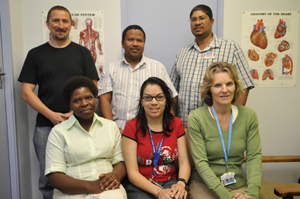A day in the life of the Safety, Health and Environment Department
03 November 2008 |
| Healthy ways: The staff of the Safety, Health and Environment Department, (back, from left) Brett Roden, Michael Langley and Barry Platen, with (front) Angie Ngalonkulu, Charlene Esau and Sue Key. |
Based in Shell Court in Mowbray, the department is staffed by Michael Langley, (manager), Angie Ngalonkulu (administrator), Barry Platen (officer assessing physical areas, fire and public safety and contractor safety), Brett Roden (environmental risk officer), Sue Key (senior occupational health nurse), and Charlene Esau (occupational health nurse).
Skills needed for the job?
An occupational health and safety qualification, a caring spirit, good communication skills, good time-management skills and the ability to multi-task.
What does the department do?
It ensures legal compliance for processing and following up on injury-on-duty claims, and runs the Occupational Health Unit for staff and students working in hazardous environments. Team members do hazardous chemical, fire, ergonomic, first-aid and general risk-assessments in all areas. They also visit departments to check on health and safety compliance, facilitate occupational safety and fire-safety talks, and investigate incidents. Other functions include: training in first aid and of safety representatives and fire marshals; safety inductions with staff, students and contractors; safety audits on all teaching and research as well as construction sites; and planning disaster exercises.
What are the challenges facing health and safety?
The seriousness of health and safety is often undermined and its central point in the person, home and work triad is often overlooked. People's perceptions are that they live and work in isolation, and getting them to accept that in the workplace each person is responsible for their own and others' health and safety is a big challenge. A health and safety mindset requires behaviour modification, as it is risky behaviour that results in unsafe conditions.
What are the highs and lows of the job?
The high point is working as part of a team that is comfortable sharing their experiences and skills. Then, there is the positive feedback the department gets from safety, health and environment representatives and fire marshals after receiving training. Lows are having 'near-miss' incidents that are caused mostly by staff and students who do not consider health and safety a priority. The department seems to be 'preaching to the converted'.
What is the strangest thing to have happened?
Everything about UCT is strange! Puff adder bites, cranes falling over, batteries exploding in their cabinets, or waste chemicals exploding. But the officials believe these incidents make it an exciting working environment.
UCT community can reach the department via our website or email us.
 This work is licensed under a Creative Commons Attribution-NoDerivatives 4.0 International License.
This work is licensed under a Creative Commons Attribution-NoDerivatives 4.0 International License.
Please view the republishing articles page for more information.










